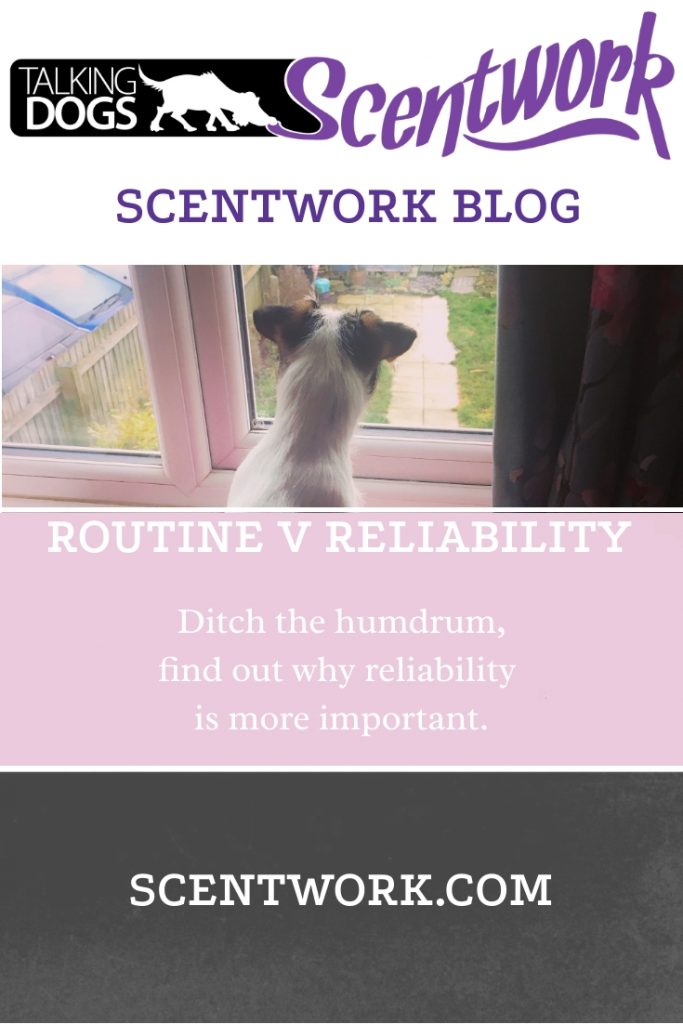People often say that dogs love routine. But I disagree. Routine is boring. Humdrum. The same walks at the same time every day can be tedious for all concerned. I see folks walking their dogs past my window at the same times every day. (I also see horses being ridden past the window at the same time every day.) Those dogs who are allowed to stop and sniff, stop and sniff the same spots. They pee in the usual place at the usual time. My assumption is that these walks serve the people more than their dogs. A set routine allows for non-thinking automatic behaviour. That’s the whole point of a routine. You automatically do what has to be done without really thinking about it. And when the routine, such as the daily dog walk, is done, we can tick that chore off the list. Functional rather than fun.
Coming up . . .
Ruts
Falling into a routine, or rut, can be easier for some dogs than others. I’ve know, and live with, dogs who only need to do something twice for it to become a routine. For these dogs, breaking routines can be very difficult. I remember a colleague’s dog who used to starting drooling when he heard the Neighbour’s theme tune for the second time every evening as this heralded dinner (and yes, I know this example dates me!) His drooling was so abundant that to ignore him was to risk drowning!
And that’s the trouble with routine. It’s very easy to set up and very hard to break. These same dogs often struggle to change undesirable behaviours which they have practised and so have become routine. This is where routines really become problematic. For some dogs any change in routine is anxiety making, stressful. From the simple expectation of dinner arriving promptly at 5pm, or when Neighbours finishes, to the more complex behaviour chain of learning to be relaxed around other dogs, change is more difficult for some than others.
Consider the dog who awaits her person’s arrival home from work at 6. By 7, with no person in sight, the dog might be pacing, drooling, panting, experiencing acute distress. And this can bleed into the next night, whether or not their person returns at the appointed hour. Having experienced disappointment, confusion and stress the previous day, the witching hour now heralds anxiety rather than excitement. What if they don’t return again? And we all know what happens when we fall down a tunnel of ‘what if’s’!
Are all routines bad?
I’m not saying that routines are inherently bad. Of course not. They serve a purpose, get things done. For example, I love search routines. Pre-search routines prepare the dog to search both physically and mentally. And having set routines in the form of search plans helps me ensure that the whole area is searched, that we don’t miss anything. (Learn about search plans in my online courses, especially my Scentwork Skills course) But the routine is mine, not the dog’s. I guide her and present and suggest areas to search. But the dog always has the upper hand when it comes to searching. Her job is to hit and locate the target scent. My job is to facilitate that in a safe and efficient manner.
And this is where strict adherence to routines can come at a cost. If a handler was to insist on the dog searching a particular item or area when she is clearly more interested in something or somewhere else, the dog might miss the find. Not only does this unhelpful interference disrupt the dog’s flow and concentration, it can knock her confidence. If she is hitting a scent but the handler calls her away (albeit inadvertently) the dog might conclude that the handler is no longer interested in the target scent. Ideally the handler should allow the dog to work where she wants, but be prepared to resume the search plan when the dog is ready.
Change the focus
Instead of routine I prefer to focus on reliability. My observation is that dogs thrive on reliability. Reliability brings peace of mind. Reliability builds confidence and resilience. My dogs know that I will always come home to them so don’t fret about what time. They know that dinner is coming but that it’s not worth getting worked up about. Being reliable teaches the dog that no matter what is happening, I will always support them.
I’ve written before about Ettie’s reactivity. She barks before she thinks. She has learned that if she doesn’t bark, or stops barking, she will be rewarded. But she doesn’t know what the reward will be. It could be food, it could be a game, it could be praise. If it is food, she won’t know if it’s cheese or sausage or chicken. If it’s a game she can’t predict if will be chasing a toy, tugging or playing with the other dogs.
Desirable behaviour reaps rewards
What she has learned, and continues to practise, is that I will always reinforce desirable behaviour. This means that she is less likely to experience disappointment which can lead to distrust and a deterioration in behaviour. If my only response to her thinking before, or instead of, barking was to play with a ball, what happens if I don’t have the ball with me, or I lose it, or we are in an area where it’s not appropriate or possible to play? Or if she only gets cheese and I run out of cheese? You can see the issue. Whereas if she is open to receiving a variety of rewards, she will never be disappointed.
You may be thinking, ‘What if she doesn’t want the reward offered?’ If she doesn’t want the reward, it’s not a reward. Key to this approach is ensuring the value of the reward. Ettie needs high value rewards when working through her reactivity. It’s no good offering her a biscuit, she’d rather bark. At times of heightened emotion she needs sausage or cheese, something super tasty and soft – she has no time for crunching when she’s in this state! So I vary the rewards, not the value.
Mindlessness
The mindless nature of routines can also make it difficult to assess change. If you are working on a behavioural issue or teaching a new skill, you need to be mindful. You need to be aware and fully present. If you are not paying attention you can’t measure the effect of your actions. You can’t adjust the regime. You can’t be accountable for what you are doing if you aren’t aware of doing it.
If you travel the same route to work every day, instead of noticing differences, you are more likely to miss them. You assume everything is the same and it’s only when somebody points out that a building has been demolished or a new billboard has gone up that you see it. When we are not mindful, we miss so much. Even when we are concentrating, we can become so focussed on the target task that we also miss behaviours or events that we don’t consider to be central to the task.
Gorilla
You might have heard of the Invisible Gorilla. This was an exercise set up by Professor Dan Simons. He had two groups of people, one in white T-shirts, the other in black T-shirts. The task was to continually pass the basketball to your team members, so white shirts passed to white shirts and black shirts passed to black shirts. In the middle of the task, as everyone was playing, a man dressed in a gorilla suit walked into the middle of the are where the teams were playing, faced the camera, beat his chest and then walked out. None of the players noticed. Many were shocked when they were shown the footage, unable to understand how they had missed this unusual and overt event.
A similar exercise was done where the participants wore eye tracking equipment. This showed that even when they looked at the gorilla for as long as a second, they still didn’t see it. Looking is not the same as seeing.
Now in most situations with our dogs, we are not looking for gorillas. But staying open and mindful of the environment, conditions, and our dogs’ responses is what makes us reliable partners for our dogs. They can rely on us acting in their best interests. They can rely on us supporting them. And so they can relax, go with the flow, feel secure. Whenever I can, I ditch the rigidity of routines which can be both numbing and triggering. And I replace them with plans that are flexible and focus on building reliability.




Wonderful post Pam! I am a huge believer in ditching the routine where possible, making exciting things a non event and having a huge tool box of ‘rewards’ that I can turn to. I love the way you explain it all! And, for the record, my old lab would go fetch his lead from the hall the minute he heard the neighbors theme tune for the second time haha! I remember having to rush home from school because my son wanted to watch Home and Away and then Neighbors would come on, then finish and the dog would want to go back out hahaha!
That’s so funny. Neighbours has a lot to answer for!
What a great article! And I completely agree with you. I’ve stopped routines for Harry. We don’t do traditional walks anymore, he doesn’t get fed from the bowl morning and evening as he once was, and I try to inject novelty into our lives.
He’s flourishing under this new approach! We have more fun together, spend more time building an even better relationship, and we laugh together a lot more…or would if dogs could properly laugh!
He’s happier, healthier and more confident. Better able to manage his responses to changes and new situations. Definitely the way ahead!
That sounds great, lucky Harry! Dogs might not laugh as we know it, but we all know they do 🙂
Thanks for a great article Pam, very good reading. Its so true dogs are clock watchers, so they need to be stable and ready for anything at any time. Your article speaks wonders and makes us think again, are we doing things right!
My dog Panda, is always ready to go to the action.
She is a working dog, explosives dog, always strong and reliable in any situation. Training has made her stable in any situation.
Working or companion, it’s great to see how our dogs thrive when they feel secure